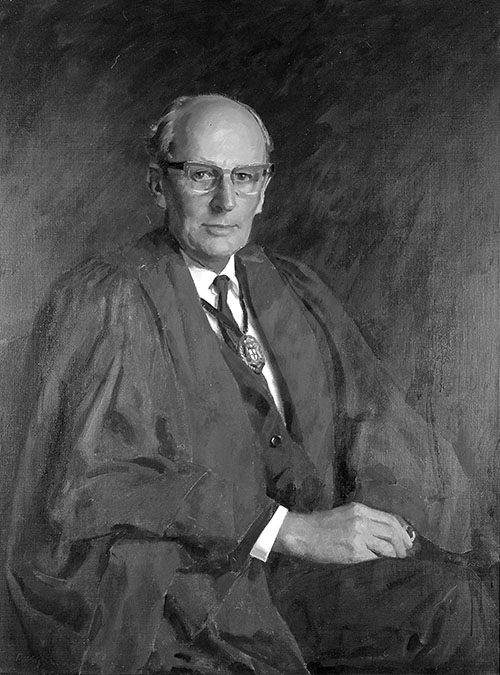
The mercurial Monty is dead. Most of us imagined that this could never happen. There were progressive clinical signs, of course, that it would, which he, with his customary fortitude, ignored and we, with our usual defence against anxiety, denied.
Elsewhere, the posts he occupied in almost all aspects of medicine, will be described and the acknowledgements of those services and skills which our profession accorded him during a lifetime of this serving. This culminated, quite recently, in our College's award to him of the Rose-Hunt medal which is bestowed on those rendering outstanding service to the College's aims and objectives, "be they patient care, educational research, organisational, or any other services". In each of these fields had he truly rendered outstanding service during the whole of his professional life.
Just as important to many of us was the personality which shone from him. Perhaps it didn't really shine; rather, it twinkled as a sort of guiding light for any one of us with problems and it was there when, occasionally the way looked black or there was gloom around us.
It was he who, being largely responsible for many things in our College including its foundation, was the architect and builder of the College Examination. His deep interest in it continued when others had taken over, and it was he who culled out the lame dogs when the examination results were published and made it his personal concern that they would be better prepared to surmount the obstacles at their next attempt. It was his helping so generously given to anyone whatsoever his status, whatever his concerns, that endeared him to so many. He was equally at home in advising on a personal problem, as he was with sorting out a complicated and vexatious PMP which required an unscheduled weekend's work to conform with the examination deadline.
There are others more competent to write of his personal medical practice. His was not the original group practice in this country - an honour which he freely acknowledged was due to the brothers Littlejohn of Ivanhoe and of whom he often spoke with gratitude for the great help and encouragement given him in setting up his Moonee Ponds group. He must have, however, created one of the biggest, best organized, and most efficient group practices in this land, and his patients who in their later years migrated elsewhere, spoke always of his kindness, his real concern, and his skill in the attention he gave them. He may not have coined the phrase "primary and continuing care" but it was always his greatest concern, and it was he who practised it secundum artem. In addition, he found time to guide and to nurture many of his colleagues through their early days of practice and not a few consultants must look back with gratitude to those initial days of their careers.
A famous philosopher once wrote that he could think of no more damning epitaph than one which pronounced that its subject never had an enemy in the world. He dilated, during his essay, on what sort of insincere character such an affirmation would undoubtedly represent. But it is difficult to imagine Monty, in spite of his forthrightness, his penetrating detection of the sophist, and dislike of the pompous, ever making real enemies. His sincerity was so patent.
Critics he had. For his impetuosity at times, his occasional stubbornness, and his ability to muck up a discussion when, sometimes arriving late at a meeting, he introduced a new and apparently irrelevant aspect to the matters in hand. But he was soon forgiven, and what had seemed an intolerable interruption to the proceedings often turned out to be a fresh and important addition to the conclusions reached.
Beyond the College proper, his influence extended in later years to all aspects of GP postgraduate education, to placement of interns with a proper matching system, and to the formation of such important organizations as WONCA, and the Group Medicine Management Association of Australia. To these last two he devoted much of his recent energy, not always with the support and assistance that he deserved and, occasionally, with real problems of their economic survival to concern him. There is considerable evidence to suggest that not a few of these problems were over come by his own personal financial sacrifice.
There must be few active members of our College who did not feel his influence and on whom some, at least, of his vitality rubbed off. It is certain that the greatest tribute that we could pay to this man and to honour his memory would be for each of us to resolve to adopt just a little of his selflessness, to conjure up in ourselves just a little of his vigour, and to regain just a little of that real concern he showed for patients and people.
Farewell Monty. We'll ne'er ken the like o'ye again.
A.N.F.
Montagu Owen Kent-Hughes
MBBS (Melb), FRACGP, FRCGP, MCFPC
Founder and senior partner, Margaret Street Clinic, Moonee Ponds, Victoria
Founder member and Member of Council 1958-72
Chairman of Board, Victoria Faculty 1956-60
Chairman Medical Education Committee of Council, RACGP 1960-66
President, RACGP 1968-70
Chairman, First Australian GP convention 1960
Australian delegate to the 1st, 4th, 5th World Conference on General Practice 1964, 1970, 1972
Director, Melbourne Medical Post Graduate Committee intern matching service
Member of Council, Victorian branch BMA 1940-58
Member AMA study group on medical education
Chairman, First seminar on group practice in Australia 1961
Vice-President, 1st International Congress on Group Medicine, Canada 1970
President 5th World Conference on General Practice, Melbourne 1972
First President, WONCA 1972-74
Inaugural President, Group Medicine Management Association of Australia
By Andrew Fraser – originally published in Australian Family Physician, Vol 5, January / February 1976.